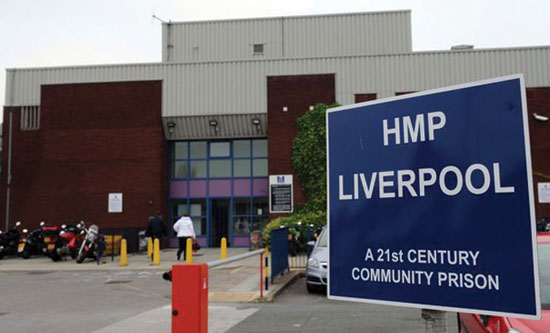
In January 2018 the Chief Inspector of Prisons published the report of an unannounced inspection of HMP Liverpool in September 2017. A draft report had been leaked to the BBC in December, which broadcast some of the findings, along with the testimony of whistle-blowers, following the self-inflicted deaths of three prisoners in the months directly after the inspection. The full report condemns the gaol not just for medical neglect but for a wide range of malpractice and negligence. Nicki Jameson reports.
Liverpool prison opened in 1855. In 2017 it housed 1,155 male prisoners. Although it did not see a major revolt in 1990 when Strangeways in Manchester and other similar ‘local’ Victorian-era prisons erupted in protest at the squalid conditions and staff brutality, it already had then a reputation for being as dirty and dangerous as any prison which did see major protests.
A series of inspections have highlighted consistent failings. We reported on the last one in 2015 and published an eyewitness account from activist John Hall, who had recently been released from the prison. He wrote:
‘Walton is a filthy, dangerous and cockroach-filled place. My cell had a rust-coloured ceiling, holes burned through most cell windows, and there were cockroaches running around my cell… There is a button in the cell for emergencies and yet when it is pressed you can be waiting for hours for a guard to respond. A guy in a cell close to me cut the top of his ear off in a desperate attempt to get help for his spice addiction… We were locked in the cell for 22-23 hours every day and there were no set times for association that I could see. We were let out according to the guards’ discretion or moods!’ (FRFI 248 December 2015/January 2016)
The 2015 inspection made 89 recommendations. In 2017, inspectors found that 22 had been fully achieved, 14 partially achieved and 53 not achieved. However, the introduction to the report states that: ‘…the bare statistics of the failure to respond to previous inspection findings do not adequately describe the abject failure of HMP Liverpool to offer a safe, decent and purposeful environment.’
The report goes on to say that since the last inspection, there had been an increase in all types of violence: ‘Over a third of prisoners told us they felt unsafe at the time of our inspection, and half said they had been victimised by staff.’
The prison regime is described as having gone from ‘unpredictably poor’ to ‘predictably poor’, with prisoners routinely locked in cells for long periods. The words of the chief inspector himself in 2017 are reminiscent of John Hall’s two years earlier:
‘Many cells were not fit to be used and should have been decommissioned. Some had emergency call bells that were not working but were nevertheless still occupied, presenting an obvious danger to prisoners. There were hundreds of unrepaired broken windows, with jagged glass left in the frames. Many lavatories were filthy, blocked or leaking. There were infestations of cockroaches in some areas, broken furniture, graffiti, damp and dirt. In one extreme case, I found a prisoner who had complex mental health needs being held in a cell that had no furniture other than a bed. The windows of both the cell and the toilet recess were broken, the light fitting in his toilet was broken with wires exposed, the lavatory was filthy and appeared to be blocked, his sink was leaking and the cell was dark and damp. Extraordinarily, this man had apparently been held in this condition for some weeks.’
The report continues in this damning vein, but concludes with yet another set of recommendations which will presumably be ignored once again, as the Chief Inspector of Prisons has no statutory power to make the Prison and Probation Service actually do anything about the failings he highlights. In 2017 then Justice Minister Michael Gove attempted to strengthen the Inspectorate’s powers to enforce recommendations, although this predictably involved replacing governors of ‘failing prisons’ with private sector troubleshooters in a plan reminiscent of ‘super-heads’ and academisation in the education sector. However, this plan, together with the rest of Gove’s ‘reform programme’ vanished when Theresa May called a snap election in which prisons were not a campaigning issue.
Enough is enough! Liverpool prison should be closed down immediately.
Fight Racism! Fight Imperialism! 263 April/May 2018




